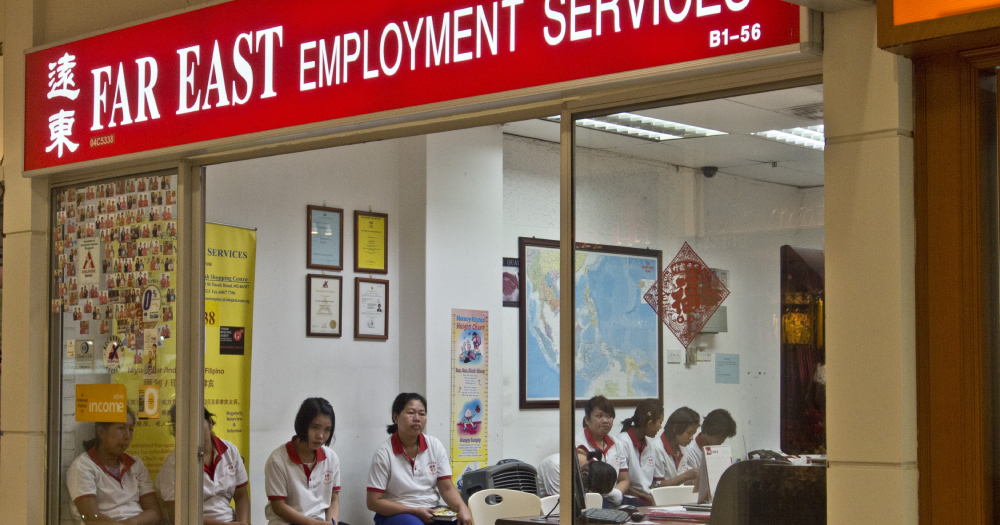What are the rights of domestic helpers in Singapore and how much is enough? How many rest days a month can they have, for example?
These are some questions that have been asked in a perpetual debate in Singapore for years now, especially in times when severe maid abuse cases surface from time to time that sparks some soul-searching.
We've heard of employers forcing their helpers to eat their own vomit, filming them secretly while they're showering, and in exceptional cases, even driving them off the edge, literally.
The Singapore government even had to step in to remind employers to feed their domestic helpers back in March this year.
But as with all debates, there are two sides to a coin.
Which has prompted at least one person in Singapore to ask: "What about employers' rights?"
Although not exactly whataboutism, such a question upends the power dynamics between employer and helper by suggesting the boss can be vulnerable to exploitation too.
ST forum writer questions employers' "vulnerability"
The Straits Times published a letter, "Maids Should have KPIs too", on Sep. 17, reiterating some problems faced by employers when hiring foreign domestic workers (FDWs).
The writer cited some worries and concerns that employers face when bringing in a stranger to live with the family "out of necessity".
He wrote:
"Having, out of necessity, to admit a stranger -- not knowing her mental state, and cultural beliefs and practices -- into one's home, affecting one's privacy and changing the home's dynamics and equilibrium, is daunting.
We must avoid demonising and treating employers as potential villains."
But a question comes to mind: Who exactly is demonising and treating employers as potential villains?
The public? The media? Or the sheer fact that those who have power can and do misuse them?
Writer argues that domestic helpers should also have KPIs
According to the letter, the argument stated was that FDWs often lied about their capabilities and "dressed up" their profiles, resulting in a lot of "tension and frustration" when the FDW is unable to perform certain tasks.
Hence, there is a need to introduce a key performance indicator (KPI) framework for FDWs, which the writer suggested.
He argued:
"Every job, even the most lowly, has a set of key performance indicators (KPIs). In working life, a worker who falls short of his KPIs is subjected to reprimand, counselling, forgone bonus, promotion freeze, and even dismissal.
FDWs cannot be treated differently. If they underperform, lie, or have a negative work attitude, they must be prepared for counselling and scolding."
Unfortunately, the writer failed to be reflective enough to suggest employers must also have KPIs, since any relationship is a two-way street.
Just wants a happy employer-FDW relationship
The writer explained that he ultimately wanted a "fruitful, understanding and happy employer-FDW relationship".
To achieve this, he suggested that a "fair and equitable framework" should be set up by all the stakeholders involved.
This includes the employers, FDWs, the Ministry of Manpower, host country governments, migrant workers' rights groups, and recruitment and employment agencies.
How exactly something like this can be implemented is unknown though.
Not the only one calling for employers' rights
Surprisingly, this wasn't the only letter published that spoke about their concerns about employers being abused.
Another ST forum writer wrote a letter, "Maid abuse? What about the reverse", on Sep. 12.
It said:
"I believe the majority of employers in Singapore treat their domestic helpers well, despite the regular reports about maid abusers.
But no publicity is given to cases where the reverse happens and maids are the ones who had taken advantage of their employers."
The writer went on to talk about the vulnerabilities that employers potentially face, as there have been instances where domestic helpers from hell abused their employers' dependents, such as young children and the elderly:
"But what about employers who are out working all day, leaving helpless infants and the elderly in the care of maids - aren't they equally if not more vulnerable to abuse by able-bodied helpers?"
To be fair, these cases are true. That's why they've been written about and published:
Easier for employers to report errant FDWs than the reverse?
And this is where power dynamics come to play.
A research paper published by Lee Kuan Yew School of Public Policy (LKYSPP) in 2016 stated that the power imbalance between FDWs, employment agencies, and employers was a "serious problem", as this made it difficult for FDWs to leave abusive employers.
Threats of fines or repatriation were reportedly used to dissuade domestic workers from attempting to leave their abusive employers, the paper wrote, which also heavily influenced them to accept unfair contracts and inadequate living conditions.
Many FDWs that report their employers are also afraid of contacting the local police for help, instead reporting to their respective embassies.
While it's true that a minority of FDWs could be abusive or unreasonable, the same goes for employers.
But the existing power imbalance between the employer and FDW makes it much harder for the FDW to get help, in a foreign country.
Two-way street
If you have a domestic helper at home, you can definitely set KPIs for them as it is within your remit.
After all, they are your employee.
But treat them like how you'd want your boss to treat you at work.
With basic dignity.
And recourse to sources of help.
Something to lighten the mood:
Top image from Majority World/Universal Images Group via Getty Images
If you like what you read, follow us on Facebook, Instagram, Twitter and Telegram to get the latest updates.
